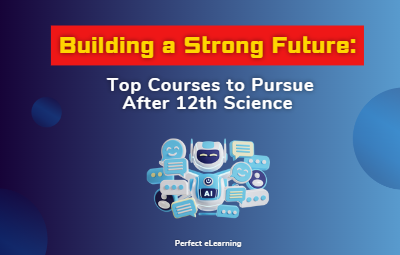

In today's fast-paced digital world, a career in computer science holds immense potential. With technological advancements transforming every aspect of our lives, there is an ever-increasing demand for skilled computer science professionals. If you have just completed your 12th grade and are passionate about technology, choosing the right course after 12th can set the stage for a successful career in the field of computer science.
The Importance of Choosing the Right Course
Selecting the right course after 12th is crucial for future-proofing your career in computer science. It lays the foundation for your knowledge, skills, and expertise in the field. A well-chosen course equips you with the necessary tools to excel in the ever-evolving tech industry and opens up a world of opportunities.
Exploring Computer Science as a Career Option
1. What is Computer Science?
Computer Science is a multidisciplinary field that encompasses the study of computer systems, software development, algorithms, artificial intelligence, data analysis, and more. It focuses on the theory, design, development, and application of computer systems and software.
2. Growing Demand for Computer Science Professionals
In today's digital era, computer science professionals are in high demand across various industries. From software development to data analysis, cybersecurity to artificial intelligence, companies rely on skilled computer science experts to drive innovation, solve complex problems, and ensure efficient use of technology.
Best Courses After 12th for Computer Science
There are several courses available for students interested in pursuing a career in computer science. Here are some of the best options:
1. Bachelor of Technology (B.Tech) in Computer Science
A B.Tech in Computer Science is a popular choice for aspiring computer science professionals. This undergraduate degree program provides a comprehensive understanding of computer systems, programming languages, algorithms, data structures, and software development. It equips students with the knowledge and skills needed to design and develop cutting-edge technology solutions.
2. Bachelor of Computer Applications (BCA)
BCA is another excellent course option for students interested in computer science. It focuses on computer applications and covers areas such as programming languages, database management, software development, and web technologies. BCA graduates can pursue careers in software development, database administration, web development, and other related fields.
3. Bachelor of Science (B.Sc) in Computer Science
A B.Sc in Computer Science offers a strong foundation in computer science principles, programming languages, algorithms, and data structures. This course provides students with a deep understanding of the theoretical and practical aspects of computer science. Graduates can explore various career paths, including software engineering, data analysis, research, and academia.
4. Diploma in Computer Science and Engineering
For students looking for a more focused and shorter duration course, a Diploma in Computer Science and Engineering is an excellent option. This diploma program covers essential computer science concepts and practical skills required in the industry. It prepares students for entry-level positions in software development, technical support, and system administration.
Specializations and Future Scope
Within the field of computer science, there are several specializations that offer exciting career prospects. Here are a few prominent ones:
1. Artificial Intelligence and Machine Learning
Artificial Intelligence (AI) and Machine Learning (ML) are transforming industries worldwide. Pursuing a specialization in AI and ML opens up opportunities in areas like autonomous systems, robotics, natural language processing, and data analysis. As AI continues to advance, professionals with expertise in this field will be highly sought after.
2. Data Science and Big Data Analytics
Data has become the lifeblood of organizations, and the ability to extract insights from large datasets is invaluable. Specializing in data science and big data analytics prepares individuals to work with complex datasets, develop predictive models, and derive meaningful insights. This specialization offers diverse career options in industries such as finance, healthcare, marketing, and technology.
3. Cybersecurity
With the increasing threat of cyber attacks, cybersecurity professionals play a vital role in safeguarding sensitive information and digital assets. Specializing in cybersecurity equips individuals with the knowledge and skills to protect computer systems, networks, and data from unauthorized access or malicious activities. The demand for cybersecurity experts is growing rapidly across industries and government sectors.
4. Software Development
Software development is at the heart of the technology industry. Specializing in software development equips individuals with the skills to design, develop, and maintain software applications. This specialization offers a wide range of career opportunities, including roles such as software engineer, full-stack developer, mobile app developer, and software architect.
Conclusion
In conclusion, choosing the right course after 12th is crucial for future success in the field of computer science. Consider your interests, career opportunities, and industry relevance when making a decision. Pursuing a course that aligns with your passion and equips you with the necessary skills will future-proof your career in the ever-evolving world of technology.
Frequently Asked Questions (FAQs)
Q1: Are there any prerequisites for pursuing a career in computer science?
A1: While there are no strict prerequisites for pursuing a career in computer science, having a strong foundation in mathematics and problem-solving skills can be advantageous. Additionally, familiarity with programming concepts and logical reasoning can help in grasping the core concepts of computer science.
Q2: What are the job prospects after completing a computer science course?
A2: Completing a computer science course opens up a wide range of job prospects. Graduates can find employment as software engineers, data analysts, cybersecurity specialists, web developers, system administrators, and more. The demand for skilled computer science professionals is expected to grow in various industries.
Q3: How long does it take to complete a computer science course?
A3: The duration of a computer science course depends on the level of the program. A bachelor's degree typically takes around four years to complete, while diploma programs can range from one to three years. Specializations and advanced degrees may require additional time.


